That equation helps Masias Maquinaria create machinery that saves money, speeds production and moves the industry toward circularity.
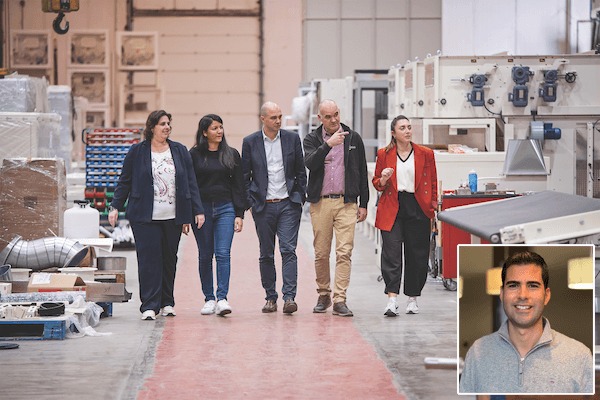
Founded in 1941 by Esmeragdo Masias, Masias Maquinaria has a long history as a leader in the development of technologies to handle and treat fibers for bedding and other home furnishings.
Masias started exporting machines in the early 1960s under the direction of its second-generation leader, Jordi Masias. At that time, the company’s efforts focused mostly on France, Mexico, North Africa and South America.
A third generation of three brothers — Esmeragdo, Lluis and Jaume Masias — joined the company in the 1980s and expanded the business worldwide, building on the company’s growing reputation for innovative technologies. In 1990, Masias Maquinaria exported its first machine to the United States.
Fifteen years ago, fourth-generation family member Patricia Masias joined the company, which is headquartered in Sant Joan les Fonts in Spain’s Girona metro area. Since 2021, she has served as general director, focusing on circularity and how automation can be used to meet emerging challenges of the sleep industry.
Today, Masias Maquinaria sells its technology in more than 80 countries on five continents. It employs 80 people, with about a dozen technicians (including one in the United States) who support customers in the field, as well as in-house teams for sales, service, and research and development.
“We do all our own programming, and all the mechanical and electronic design for our machines also is handled by our own team, optimizing the quality of our equipment, project support and other services,” says Sonia Ortiz, area manager for Canada and the United States. Customers have a specific sales representative assigned to them, so they know exactly who to call if they have a question, she adds.
Turnkey solutions
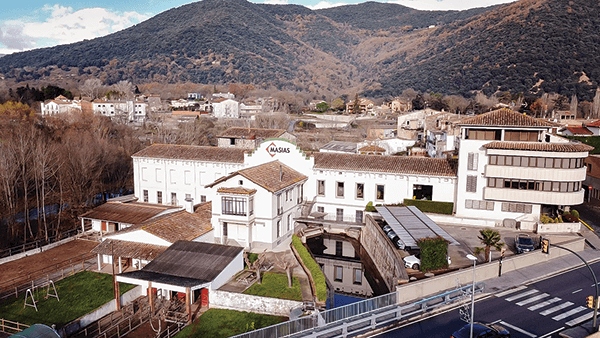
les Fons, part of the Girona metro area in Spain.
Masias Maquinaria specializes in designing, building and installing turnkey machinery lines for four key markets: Home textiles (pillow, upholstery cushioning and quilt/duvet manufacturing systems); bedding (mattress layer filling and production, including felts and waddings); apparel (fiber processing for jackets and other outdoor clothing); and circularity (recycling systems).
In the sleep arena, Masias offers machines for fiber opening and blending; fiber ball manufacturing; pillow and cushion filling; pad forming (airlay) for mattress pads, quilt layers and comforters; and nonwoven carding. It also provides recycling solutions, such as Flexipad, which produces thermobonded replacements for foam and comfort layers that incorporate recycled production scraps.
Thinking green
Masias Maquinaria’s pivot toward sustainability began about a decade ago. That’s when executives began thinking more about how the company’s expertise in building filling machinery could be used to help its customers not only reduce waste but put their production scraps to good use by incorporating that material into new bedding products.
“Everyone is interested in avoiding or reducing the waste of production process remnants, as this generates two important problems in factories,” Patricia Masias says. “First, there’s an economic problem because the quantity of high-quality raw materials is dwindling. And secondly, there’s an environmental problem, since waste is being generated that must be properly managed, which generates more costs.”
To address those issues, Masias Maquinaria designed a new generation of specialized equipment to help its customers recover production waste, including foam remnants and mattress panel offcuts from quilting lines, and turn them into valuable fillings or felts for new items, including mattresses, dog beds, upholstery and decorative cushions.
The Flexipad system creates new filling layers and felts by mixing a thermobonding fiber with foam or fiber waste. In addition to using manufacturing scraps, bedding producers also can add synthetic fibers, such as polyester or lyocell, or natural fibers, such as cotton, wool or hemp, to create their own wadding rolls.
“With this approach, scraps are not considered anymore as waste — they actually are converted into an asset,” Ortiz says.
This focus on new solutions is central to the company’s success. “An important equation for us is ‘materials plus technology equals product,’” Ortiz adds. “We are always looking for new ways to explore the mix within that equation because any change in materials or technology can result in an entirely new product.”
Sharing ideas
Masias Maquinaria introduced Flexipad last May at Interzum Cologne in Cologne, Germany. To demonstrate the system’s broad capabilities, the company displayed two mattresses made entirely of recycled fibers and foams.
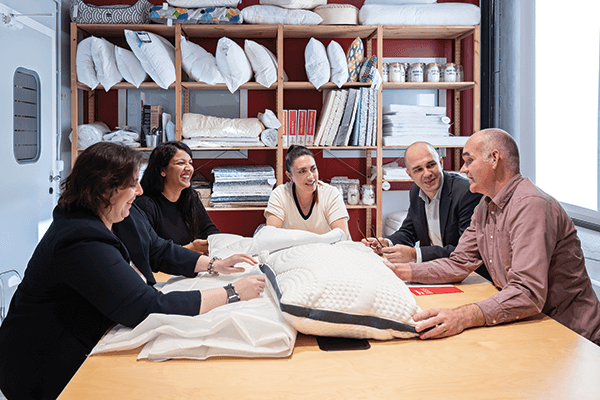
production equipment to show mattress producers how they can efficiently make their own branded pillows.
“We had a steady stream of visitors at Interzum from all over the world,” Patricia Masias says. She adds that Flexipad is designed for use by mattress and upholstery manufacturers but also can benefit producers of nonwovens and insulation.
To follow up the Interzum launch and provide an opportunity for potential customers to try Flexipad themselves, Masias is showcasing the line in action at its headquarters testing facility in Spain.
“We’re inviting anyone who is interested to come here and see Flexipad’s potential for themselves,” Patricia Masias says. “They can come with their own scraps and other materials and see how Flexipad can be used to repurpose them into something new.” If they prefer, manufacturers can send materials to Masias, which will conduct a trial and send the resulting materials back to the customer.
“Masias Maquinaria has always been committed to the search and sharing of new solutions and applications, and to the constant evolution of the machinery that makes up our portfolio,” Patricia Masias says. “Over many years, we’ve made the necessary investments to create a modern and complete test center, led by Lluis Masias Jr., which includes the main machines for the processing, production and recycling of filling materials. This facility allows us and our customers to perform testing with new materials and conduct industrial-scale runs for key production processes.”
Big plans for EXPO
At the upcoming ISPA EXPO, March 12-14 in Columbus, Ohio, Masias Maquinaria will spotlight its Flexipad system, as well as its diverse line of machinery for automated pillow and cushion filling. Attendees also will have the opportunity to visit Fluvitex USA in nearby Groveport, Ohio, a sister company that is using a wide variety of Masias machinery to produce pillows, quilts and comforters for a global retail chain.
Opened in 2018, Fluvitex USA is managed by Ferran Masias, also part of the family’s fourth generation. The 123,000-square-foot plant uses an innovative “filling station” concept originally introduced by Masias in Spain, where it operates a similar facility for the same retailer’s European stores. According to Patricia Masias, the plant’s Smartfill system — which enables multiple types of pillows to be produced easily on a single line — increases productivity by about 50% over previous filling systems.
“The line was developed with complete flexibility in mind in terms of product sizes, fabrics, covers and fills, making it easy to switch from one product to the other,” Masias says.
The company sees user-friendly solutions like its Smartfill process as a way “to reduce the labor shortages and higher turnover rates that so many manufacturers face,” Patricia Masias says. “By using smarter production tools, they can reduce the amount of labor required to make their pillows and beds.”
Over time, the company’s machinery has steadily become more automated, and executives expect that evolution to continue. “A machine in the past might have 200 settings that an operator could control,” Ortiz says. “Now, there may only be 20 settings.”
Setting up and operating the Fluvitex sleep products manufacturing facility has been a huge benefit for Masias, according to Ortiz, who was involved in the launch of the U.S. operation.
“It’s been a fantastic experience,” she says. “We can see what works and what doesn’t in every level of the operation, from the flow of materials into the plant to the setup of the machines, training and workflow.” That information, in turn, helps inform all of Masias’ machine development, as well as recommendations it provides to customers when helping them design new plants and production lines.
Potential in pillows
While some U.S. manufacturers have their own pillow brands, many bedding producers have overlooked this segment of the business, Patricia Masias says. “At ISPA EXPO, we plan to give producers a better understanding of what’s involved in pillow making and how our equipment can provide an effective solution if they decide to make their own branded pillows themselves.”
Masias Maquinaria’s technology makes it possible “to use the same automatic production system for a variety of fill materials, including polyester fibers, cluster fibers, microfibers, foams and natural fibers like wool or kapok — or a blend of any of these products, Ortiz adds. Manufacturers can mix as many as three different materials at a time and can adjust the weight of the filling.
Masias Maquinaria’s automatic, blown fiber pillow production lines can produce from 1,000 to 4,000 pillows per shift, or as many as eight pillows per minute. These lines can be completely automatic or manual, depending on the customer’s degree of specialization.
Masias Maquinaria also offers a patented production system called Comfort Line. This flexible, compact, modular solution produces high-quality garnetted pillows, comforters and mattress panels. The system is intended for three markets: customers that produce quilting wadding rolls, importers of filled products wanting to start their own production and mattress manufacturers seeking to produce their own top-of-bed accessories.
A key element of the Comfort Line is the Rollpillow system, which enables the production of garnetted pillows using several different natural or machine-made fibers, mixtures of fibers and foam, or even cluster fibers. The Rollpillow line can produce as many as 16 pillows per minute.
By adding Masias’ Q-connect accessory to the Rollpillow system, producers can create a complete Comfort Line that produces pillows, quilts and mattress panels in one integrated operation.
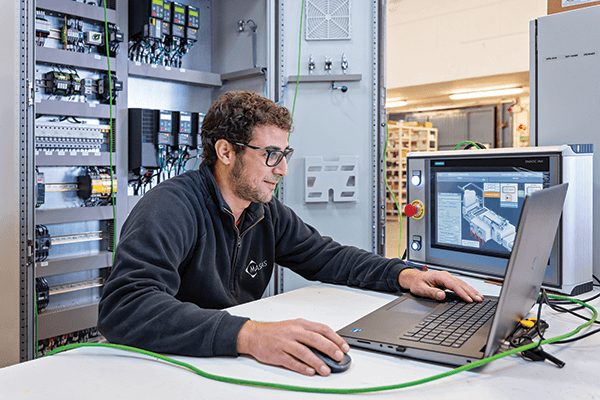
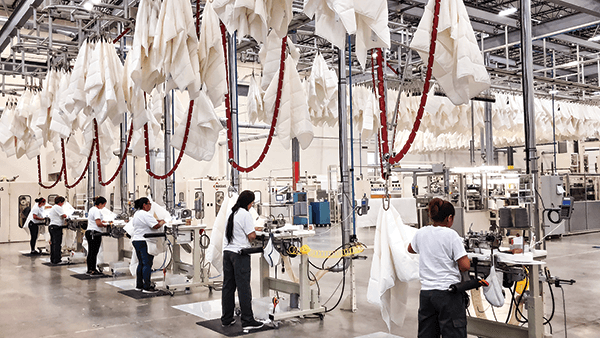
in Groveport, Ohio.
“This flexibility is especially important to U.S. bed and pillow producers,” Patricia Masias says. “The range of products being made in America is very different than in Europe. There are hundreds of mattresses and pillows on the market in the U.S., and producers are constantly coming up with new constructions and formulas. In Europe, the range is much more limited, and consumers are satisfied with fewer options.”
A true partner
At Masias Maquinaria, the goal is not only to sell machinery and equipment, Patricia Masias says, but also to serve as a trusted, long-term partner for customers as they improve their products and performance. To deliver on this promise, the company emphasizes service.
“We can offer innovative solutions to improve functionality of existing machines, whether it is updating the electrical or main mechanical parts, reducing maintenance costs or optimizing production processes,” Patricia Masias says. “Our machines last a long time. There are still quite a few in use that were built before 1980.”
Masias Maquinaria’s goal, Ortiz says, is to give clients an immediate response to issues, “since we understand how important it is to avoid halting a production process, even for a short time. … At Masias, customer service is not a department, it’s an attitude.”
Working side by side with Fluvitex, which has been steadily producing more than 12 million pillows and quilts annually for the past decade, has increased Masias Maquinaria’s understanding of what is most important when it comes to daily operations and costs. This knowledge base benefits Masias Maquinaria’s customers in their own operations, according to Patricia Masias.
“We are looking forward to ISPA EXPO in Columbus,” she says, “and invite everyone who is interested to come join us for a tour of our live factory, where we can share the latest ideas about circular solutions.”




